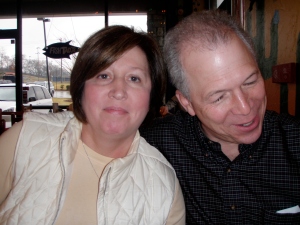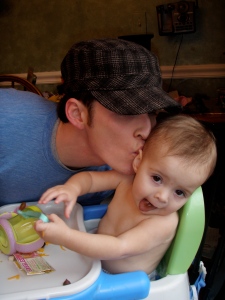Mom and Dad
March 28, 2009
Two Foxes ::
1) My mom.
She is right most of the time. On the one hand, when I go to her for relationship advice, she asks questions like, “Do you think she was thinking this?” and I have to say, “Mom, for me to even guess at that is counterproductive.” On the other hand, she knows intuitively when something is amiss, when I’m too nonchalant, not excited enough. She likes to say that “It shouldn’t be work in the beginning. It should just be fun. Plenty of time to work at it later on.” So simple and so true. My sweet mom.
My mom is an ace at hospitality. She loves cooking for people. She’s told me that is one of her outlets for creativity.
Birthdays and holidays are always a big deal. For Valentine’s Day, she bought me a leather chair and ottoman at an estate sale. My parents, my older sister, and my nieces came to visit me and brought it.
She’s always thinking about other people. She’s both unselfish and generous, to the degree that I want to protect her so that people don’t take advantage.
I love how fiercely she loves my two sisters and me. I have never doubted that love. 
2) My dad.
He used to scrape the ice off our windshields so we could drive straight to school without waiting on the defroster.
My dad and I went to Haiti together, and it was a blessing to see one another in a different context. He got to see me when I feel most alive—traveling and serving. He told me how proud he was to see me work so hard and take charge and keep a sense of humor. We got into an argument—our arguments are more discussions than antagonistic—when I talked about buying some Cuban cigars. He thought that might offend some people in our group. However, that conversation led to another conversation in which we agreed not to doubt one another’s sincerity in faith matters anymore.
My dad is a rock. He can be so silly and quirky too. He takes really good care of things. I’ve only ever seen him use one riding lawnmower. He bought it used and has used it over 24 years! He always does what he says he will do. He’s a man of his word. I like making him laugh until he cries. He can be mischievous: he was always pulling April Fool’s pranks.
Despite those gags, I trust him. I remember reading Wild at Heart in high school and thinking, “Gosh, what are my father wounds?” The only thing I could come up with is that I wish he’d taught me to take risks. I’ve had to teach myself, but that doesn’t leave very much room for complaint. A Christlike attribute of his: He has the humility to say, “I’m sorry,” and “I don’t know.” I’ve never lost respect for him for saying either.
I get embarrassed at Christmas because my parents are so generous. When we all would go back to school after Christmas and everyone was discussing their presents, I never wanted to say anything because it was always a conversation stopper. I thought our family would seem materialistic.
One time I was listening to my parents go back and forth accusing each other of snoring. I started laughing. They both turned to me and said, “What?” “You both snore!” I said. They always wanted me to come in and kiss them goodnight when I got home. That’s how I knew.
I’m proud of my parents. If you want to make your dad or mom cry, tell them you’re proud of them. Works every time.
Be the change you want to see
March 26, 2009
Last September, I was in Destin with my family. What began as a verbal skirmish between my brother-in-law and me after a game of Wii Tennis—competition can bring out the best or worst in men—became a full-scale battle that ended with my telling my family that I thought our style of dealing with conflict was unhealthy, insensitive, and passive aggressive.
I observed that our family nurtured no open dialogue to accommodate hurt feelings. We swept everything under the rug. Hurt feelings often went unacknowledged and were given a change to grow into resentment and bitterness. Rather than give one another the freedom to express hurt feelings, we found ways to mitigate our own discomfort and wounded one another further by saying, in effect, “You’re being hypersenstive. Get over it. Shouldn’t you have moved past that by now?”
I’m not saying that I was in the right. Deciding who was right or wrong was missing the point. What I wanted was openness and honesty.
The problem with how I often communicate is that I am so adamant about justifying my point of view that I alienate the very people whom I meant to persuade. I have listened as certain street preachers who in a genuine desire to see people come to know the immeasurable riches of Christ spit out caustic rhetoric that scorched the ears and hearts of passers-by. The pendulum swings, and we wound the very people who wounded us in an effort to convince them that wounding people is wrong. We kill people to save them. Before he became Charlemagne, Karl the Great conquered the Franks, and he gave them two options—baptism or execution.
I am very close to my parents and two sisters, and I wanted to enjoy even greater depth and sweetness in those relationships by practicing more empathy and better listening. I probably just sounded pissed off.
I went to my room, got down on my knees, and I prayed, “God, give me a word. Give me a ray of light.”
I listened for awhile, and He spoke in that strange way of his that is sometimes the sound of wind in high branches and sometimes the quiet presence of an old friend, but this time was like something overheard from across the room. I almost missed it. He whispered, “Be the change you want to see.”
I need to talk less about what I wish were different and instead kneel before the Father and ask Him to transform me into a sensitive, empathetic son and brother who listens well without scrambling to protect myself.
Be the change you want to see.
Leo Tolstoy had this epiphany long before I did: “Everyone thinks of changing the world, but no one thinks of changing himself.”
Gandhi, too: “We must become the change we want to see in the world.”
Do you wish the people in your life did a better job a taking care of you? Do you want to receive more love, joy, peace, patience, kindness, goodness, faithfulness, gentleness, and self-control?
Stop focusing on what you cannot change—other people. Start focusing on what you can change by the grace of God—yourself.
Be the change you want to see.
ace of spades
March 19, 2009
Faith is peeling onions, layers beneath layers, questions beneath questions.
Faith is a palimpsest where the old words are read with the new. As soon as I formulate questions, lick the seal, and send them to God for a reply, I find myself in another season of waiting. Patience is also called “long suffering.” Uncertainty condenses on the surface of my faith. The questions we ask make us who we are.
Why did melanoma kill my grandfather?
I want God to explain why cancer reduced this man’s body to grotesque angles under a white sheet. At the visitation, the line to look into the casket stretched across several rooms. Friends came out in droves to pay their respects. I have never visited his grave since the burial. Why?
My family continues to make comparisons. They call me “Little Roger.” They point out the shape of my face, my lips and my gregariousness. They say people are drawn to me the way they were drawn to him. Some shoes to fill.
Why take Roger Church, a man who did the things he said he would do?
He might have helped me understand myself. Where is he, Jesus? Lazarus walked out of the tomb two thousand years ago. What has his blinking in the sun to do with me? Where is Roger Church? Paradise or Abraham’s Side? Purgatory or writhing in Hell?
That side of my family gets together less often now. I wish Jesus Christ would breathe my grandfather’s spirit back into his rotten body. People would scream, seeing an old man claw his way up from six feet under. Maybe he would hitch a ride down Thompson Lane to his house on Belmont Avenue. Would I believe in Jesus’ resurrection, his healings and his miracles, if I got a call on my cell phone from my grandfather? Would I believe if I touched his hands across the old cribbage board we used? If he handed me the deck of cards we buried with him? I still have the ace of spade I took out of the deck when no one was paying attention.
People tell me, the have told me my whole life, that I should imitate Jesus. Preachers toss abstract concepts and neat formulas out over the audience. They travel back to Isaiah to fill in the Gospels’ gaps:
For He grew up before Him like a tender shoot, And like a root out of parched ground; He has no stately form or majesty That we should look upon Him, Nor appearance that we should be attracted to Him. He was despised and forsaken of men, A man of sorrows and acquainted with grief; And like one from whom men hide their face He was despised, and we did not esteem Him. Surely our griefs He Himself bore, And our sorrows He carried; Yet we ourselves esteemed Him stricken, smitten of God, and afflicted. But He was pierced through for our transgressions, He was crushed for our iniquities; The chastening for our well-being fell upon Him, And by His scourging we are healed.¹
I believe Jesus of Nazareth is the fulfillment of Isaiah’s prophecy, but I have questions.
I need to know what Jesus would whisper in my ear if I were about to attack some pervert who touched my wife or my daughter.
I need to know what Jesus would think of voting, sex, and capitalism. Yes, when Lazarus died, Jesus called him back from death. I believe it. Jesus is the Son of God. Jesus raised Lazarus from the dead. He quoted Isaiah: “The Spirit of the Lord is upon me, because he anointed me to preach the gospel to the poor. He has sent me to proclaim release to the captives, and recovery of sight to the blind, to set free those who are oppressed, to proclaim the favorable year of the Lord.”² He made an immediate and physical impact on people’s lives. He gave people their health. He gave purpose to their souls. He returned their dignity. He restored them to their communities.
Can I raise men from the dead?
Lord, help me with my unbelief. I am a product of my environment. Perhaps no one I have ever known believed anyone in this day and age would be raised from the dead without defibulators or a blood transfusion. My younger sister and her boyfriend discovered one of the maintenance personnel, Zacharias Sbathu, dead in his truck. His family depended on him for their well-being. Our prayers did not raise him from the dead. Is it true? Is prayer powerful? Why didn’t it work? Zacharias worked two jobs for seventy or eighty hours a week to build a life for his family. Where was Jesus to raise this man from the dead?
Jesus wept. Jesus prayed: “Father, I thank You that You have heard Me. I knew that You always hear Me; but because of the people standing around I said it, so that they may believe that You sent Me.”³
If I cannot raise people from the dead, what is the faithful response for a man of God when faced with death and violence?
¹ Isaiah 53:2-5 (NASV).
² Luke 4:18-19; Isaiah 61:1-2 (NASV).
³ John 11:41-42 (NASV).
Nieces
February 17, 2009
I have two nieces, Emery and Merrill.
Emery
Emery, the older, is almost four. She tilts her head up to me and looks at me with her big, almond-shaped eyes and asks, “Bud, do you want to play with me?” She is so shy that she needs thirty minutes to warm up when she hasn’t seen me in a while. Once she warms up, though, she wants to ride everywhere on my shoulders. I love this. We talk about what we see and her favorite things and what she’s been doing. I can almost hear her mind work.

I love her simplicity and trust. She doesn’t know to get embarrassed about certain things like staring at strange-looking people, picking her nose, or eating meal composed entirely of bacon. The rest of her diet includes chicken nuggets, chocolate, rice, and a few other foods. My mom—Emery calls her “Kiki”—gave her $3 for Valentine’s Day, and Emery showed me how much money she had in her purse. When people fart or whatever you want to call it, she grins, wrinkles up her nose, and whispers, “Toot, toot.” Sometimes, she starts giggling. Emery brushes hair out of her face with the affectation of a tiny princess.
Merrill
Emery’s younger sister Merrill turned one in December. This past Saturday, February 14, 2009, she developed a new trick: whenver she saw her mom, my older sister, she would shriek a very happy shriek which made everybody within earshot turn and smile. Such a big noise from a little source. Merrill weighs just under sixteen pounds, but she’s been walking for months. She’s the smallest walking person I’ve ever seen. She’s much more outgoing than her older sister. While we were in Mast General Store the other day, she walked right up to an old woman who was looking at sock monkeys and wrapped her arms around the woman’s legs and leaned into her. The woman was, of course, delighted, and started telling my dad and I about her great-grandson Dominic. “Irish through and through,” she said. Merrill was on to other adventures at this point.
Merrill is uncomplicated. When she’s tired, she cries. When she’s hungry, she cries. She has a small red birthmark between her eyes that looks like a bindi. But the most important thing: she reaches for me. She’ll snuggle her head into the crook of my neck. This tiny child doesn’t even weigh enough to make it on the charts that follow a toddler’s development. Yet, when my mom told her no, she stamped her foot. How is that possible? She is so breakable and loving. How can she be so loving?

I pray that they both grow up and fall in love with God the way I fell in love with them. I know that life will break them at some point. I hate thinking about it. But at least I know of a good place for broken people—the heart of Jesus.